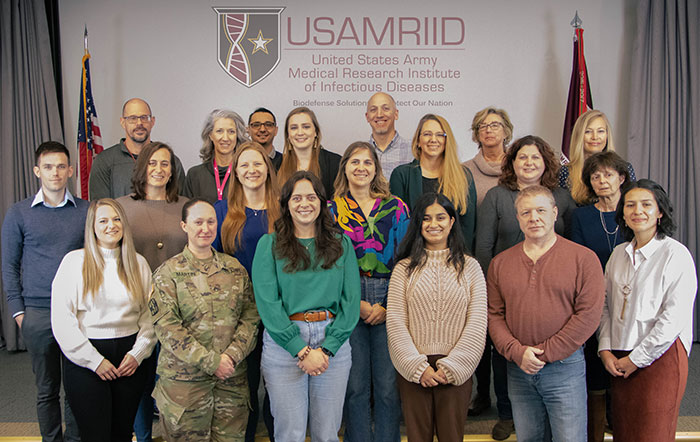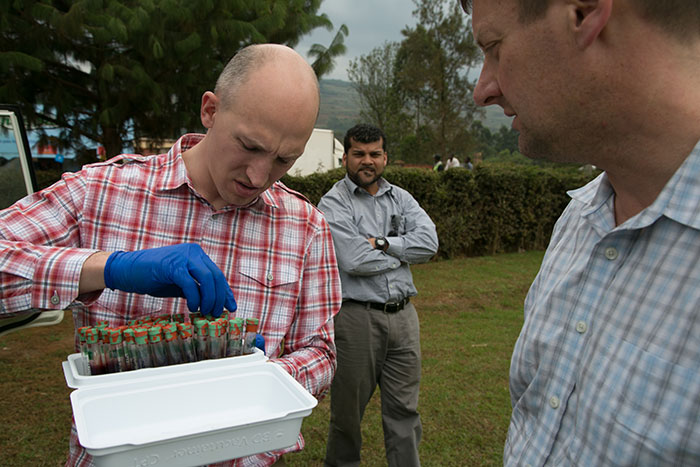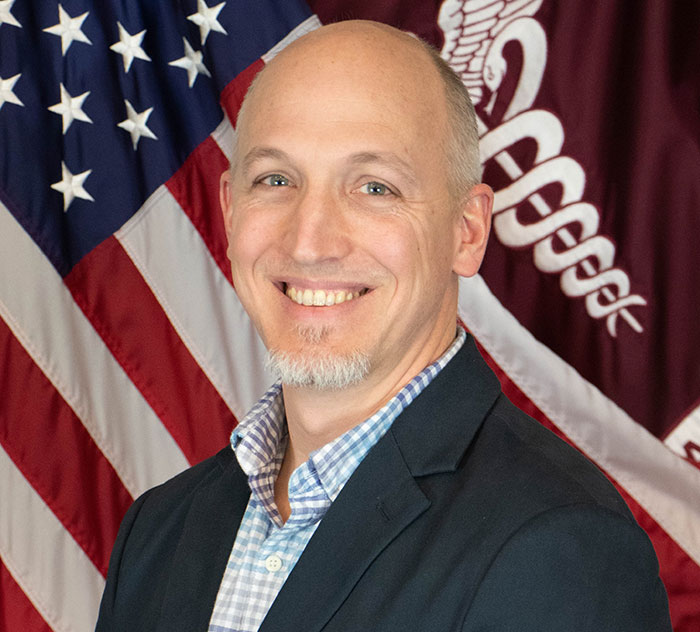Herbert Puts Team First in Securing USAMRDC 'Employee of the Year' Award

"In short, I tell them that while I can't promise they're going to love every day when they walk into the lab, my goal is to create an environment where they want to come to work every day, an environment where they can have fun and find fulfilment," says Herbert, whose official title is chief of the Viral Immunology Branch at USAMRIID, a position he's held since 2021. "And for the most part that bears true, because people really enjoy what they do here."
It's that kind of leadership – and that kind of attention to the professional needs of the branch's 20-person strong team – that's responsible, in part, for Herbert being named the 2022 USAMRDC Employee of Year. Following a banner year in which, among other achievements, the branch managed a total of 19 research programs while publishing eight articles in some of the world's top peer-reviewed scientific journals – efforts which, notably, scored Herbert the 2022 USAMRIID Employee of the Year award as well – he is eager to use his accolades to raise the profile of both his team and their substantial endeavors.
"I'm not one for the limelight," says Herbert. "I don't take compliments very well – it's a little bit out of my nature – but I'm humbled and honored by the recognition of the team's contribution to MRDC. I'm obviously excited about being selected."
By allowing the team the time and space to tackle the so-called "everyday science" required within the scope of their portfolio, Herbert, who started at USAMRIID in 2009, has settled into a role that is, among other things, part project manager, part talent scout and part mentor. By continuously searching for – and securing – new, exciting projects to put before the team, they can in turn use those projects to attract new talent to USAMRIID; a pairing which ultimately stands to benefit the Warfighter – and, in some cases, the global population. From there, Herbert can ensure proper portfolio management and technical support while providing guidance when needed.

As for his portfolio itself, Herbert notes that a key feature is that it does not target any specific virus or area of research. Instead, he says, while the chief focus is medical countermeasure development, the team relies on platforms that can be utilized to research and test potential vaccines and therapeutics for a number of different viruses; Ebola virus and Marburg virus among them. To that end, in the past year the team concluded an effort to develop monoclonal antibody-based therapies to combat both Marburg virus and Crimean-Congo Hemorrhagic Fever virus. The team traveled to Uganda to collect blood samples from survivors of both viruses in order to identify the antibodies that allowed those people to conquer the infection. Those antibodies are soon scheduled to be reproduced at commercial scale, ultimately making them available to the Warfighter and the general public as treatments. In a similar vein, the team, having previously collaborated with industry partner Mapp Biopharmaceuticals to develop a specific antibody cocktail to protect against Sudan ebolavirus, then dispatched that cocktail – referred to as MPB134 – to Uganda in late 2022 for compassionate use in those suffering from the virus. A clinical trial specific to MPB134 is scheduled to commence in the coming months.
"As a virologist, there's very few places in the world where you can do what we do at USAMRIID," says Herbert. "Having the ability, via our BSL-4 containment facilities, to work with these viruses – that ability allows us to collaborate with industry and academic partners all over the world. Being able to do things that I can't do elsewhere is what brings me in every day; we make these connections with people who need our support to move their programs forward. We're the people that others come to in order to run those pivotal studies that can't take place, in many cases, almost anywhere else in the world."

Whether he likes it or not, Herbert's efforts have translated into a larger profile outside MRDC as well. Recently, TIME Magazine recognized EVUSHELD – an antibody cocktail developed, in part, by the branch and designed to protect against SARS-CoV-2 infection – as one of the "Best Inventions of 2022". The product, developed with industry partner AstraZeneca, received a U.S. Food and Drug Administration emergency use authorization as a pre-exposure prophylaxis to prevent COVID-19 in people who have compromised immune systems. EVUSHELD further received an EUA for individuals who have a history of severe reactions to substances in COVID-19 vaccines. As of July 2022, more than 165 thousand immunocompromised individuals have received EVUSHELD treatment, signifying a key contribution by both the Viral Immunology Branch and USAMRIID in the battle against COVID-19.
"Dr. Herbert's unique combination of soft skills, scientific acumen and unwavering professionalism enabled these amazing accomplishments," says Col. Todd Bell, director of Foundational Sciences at USAMRIID and the person who nominated Herbert for the award. "His team's efforts have been instrumental in USAMRIID's overall success. They are setting the standard for biodefense research."
Indeed, the team remains paramount for Herbert. By working tirelessly to set up the Viral Immunology Branch for success, he is able to turn the lab itself into a force multiplier. The recognition is appreciated, but it's the impact the team is able to make outside of USAMRIID that truly matters most.
"We want our people to be certain in what they're doing, and we want them to know how they're impacting the overall mission," says Herbert. "I'm blessed to have really talented people around me, as well as people that I find joy in mentoring and watching them grow. I try to foster the kind of environment where you're excited to come to work."














